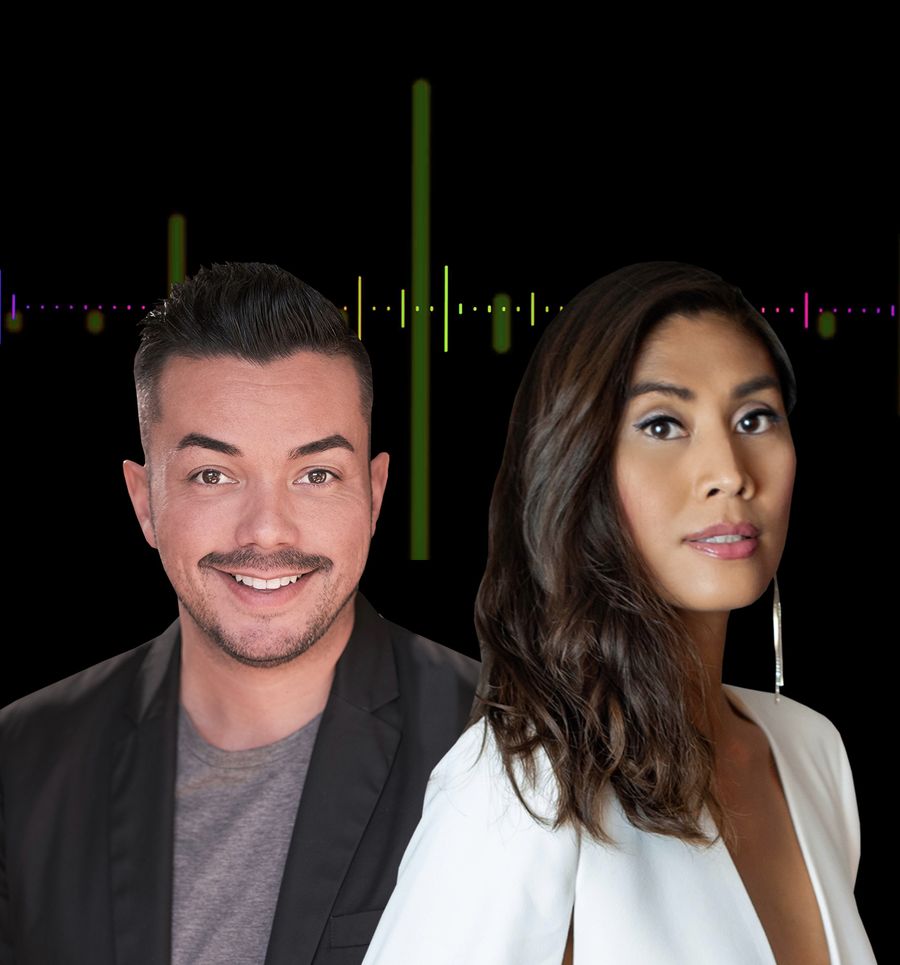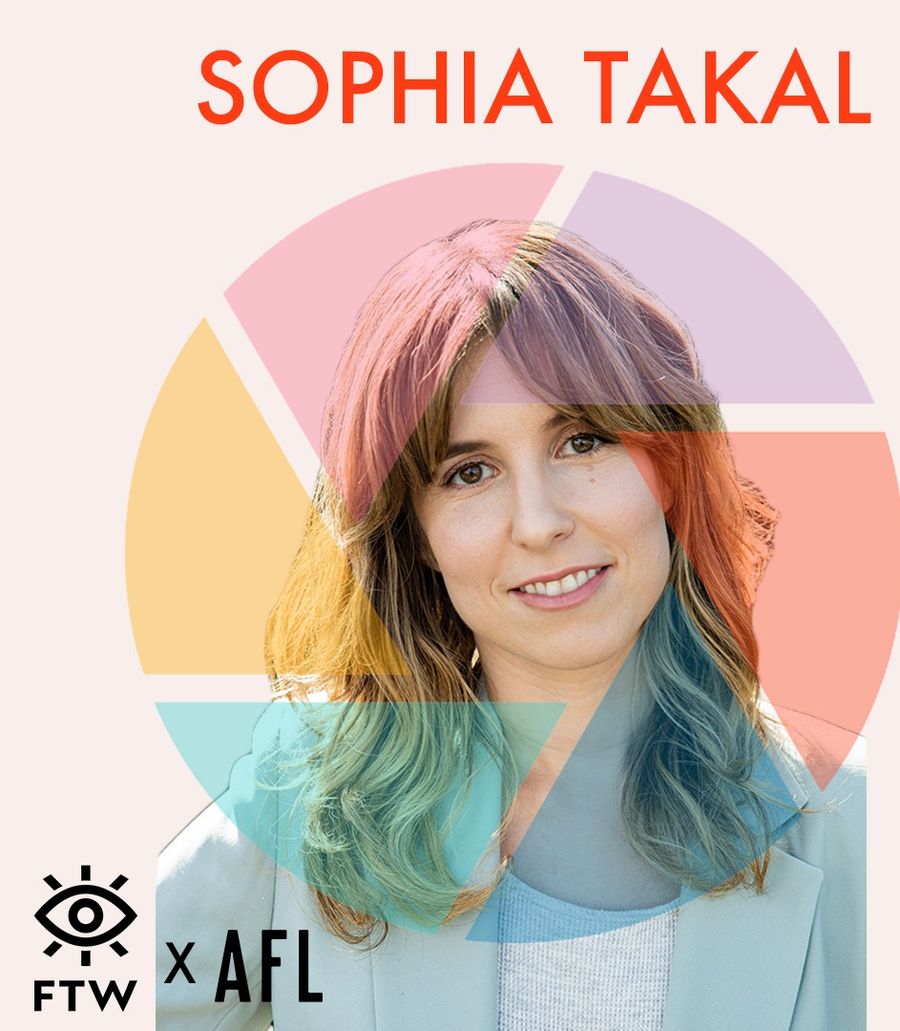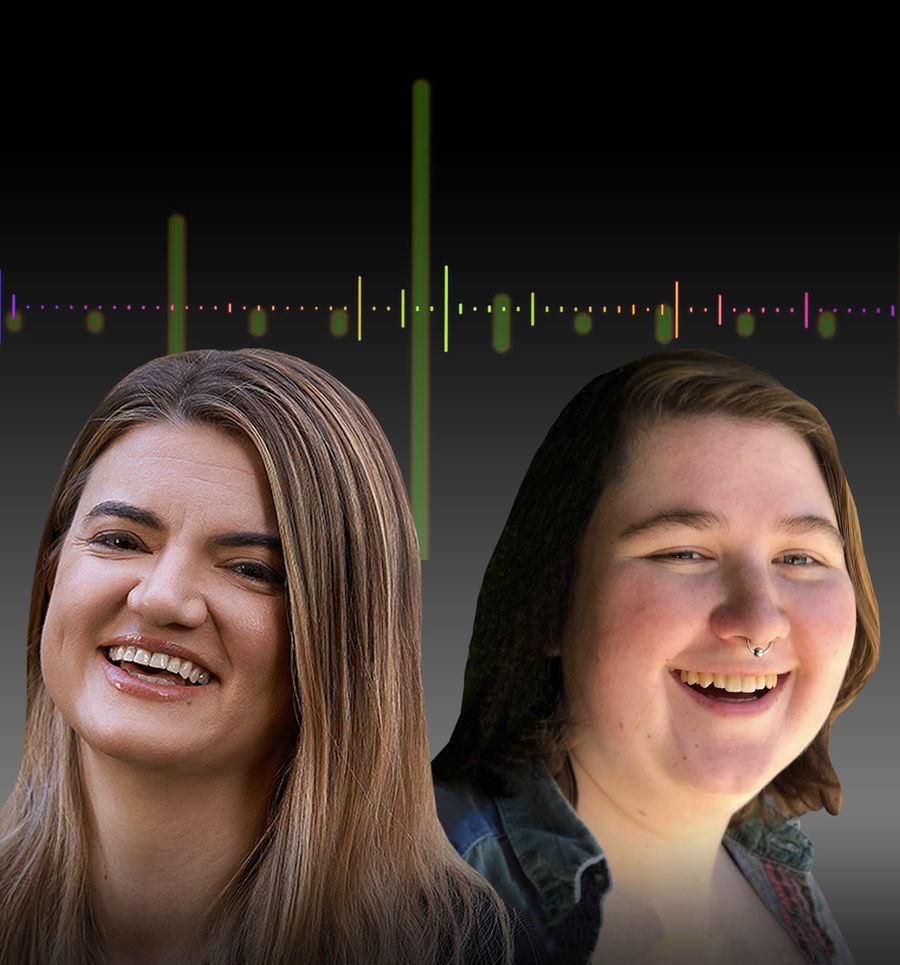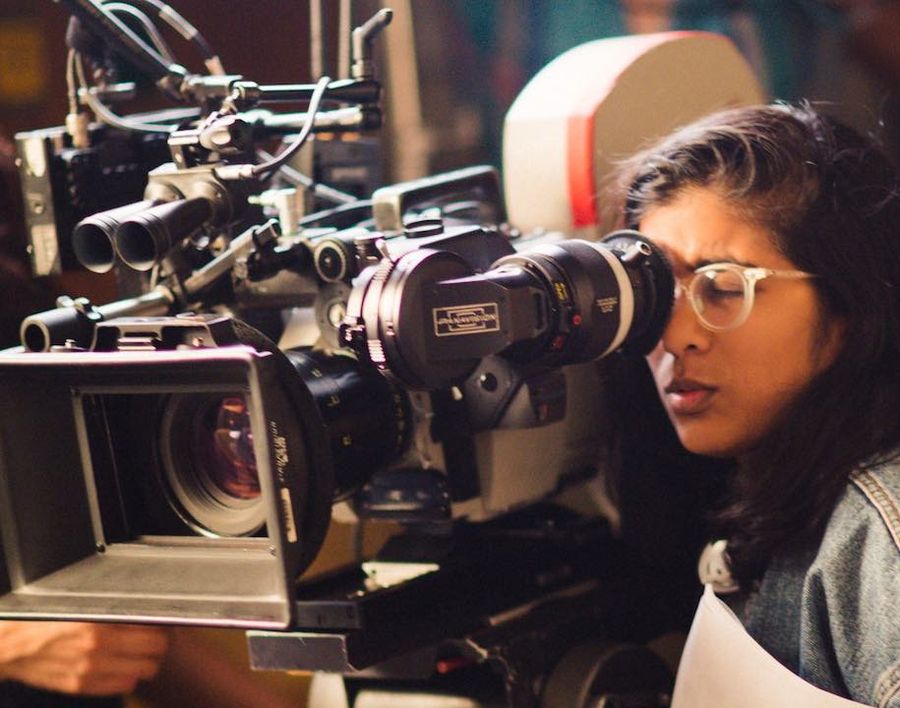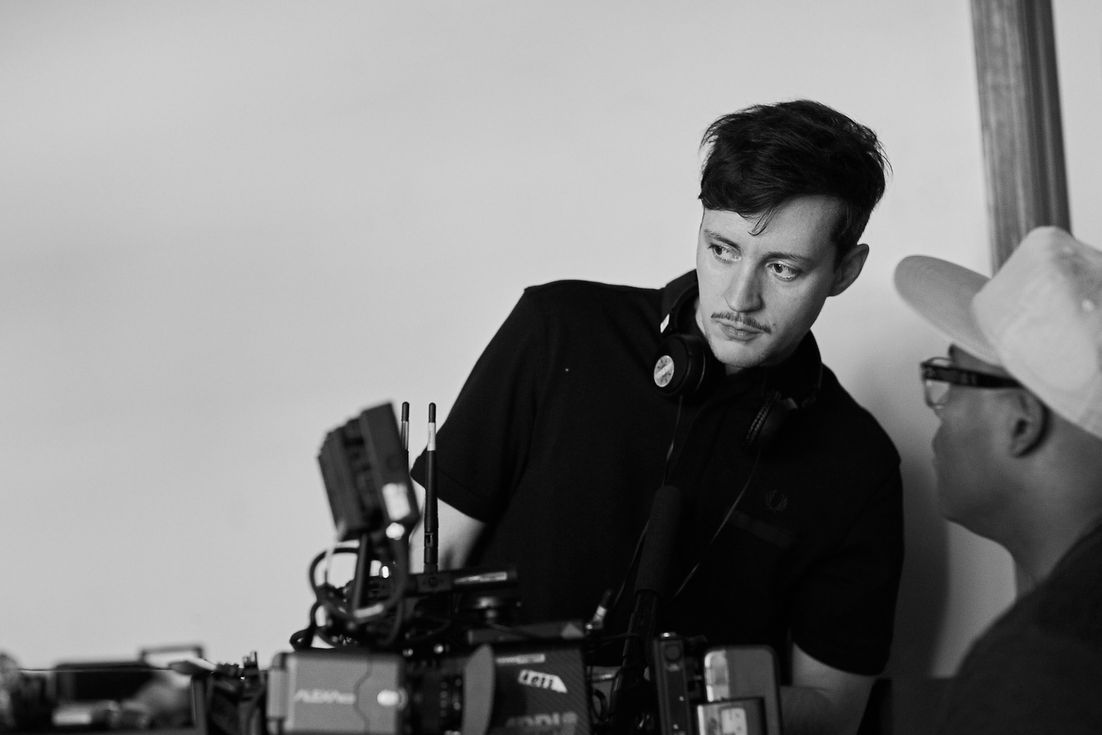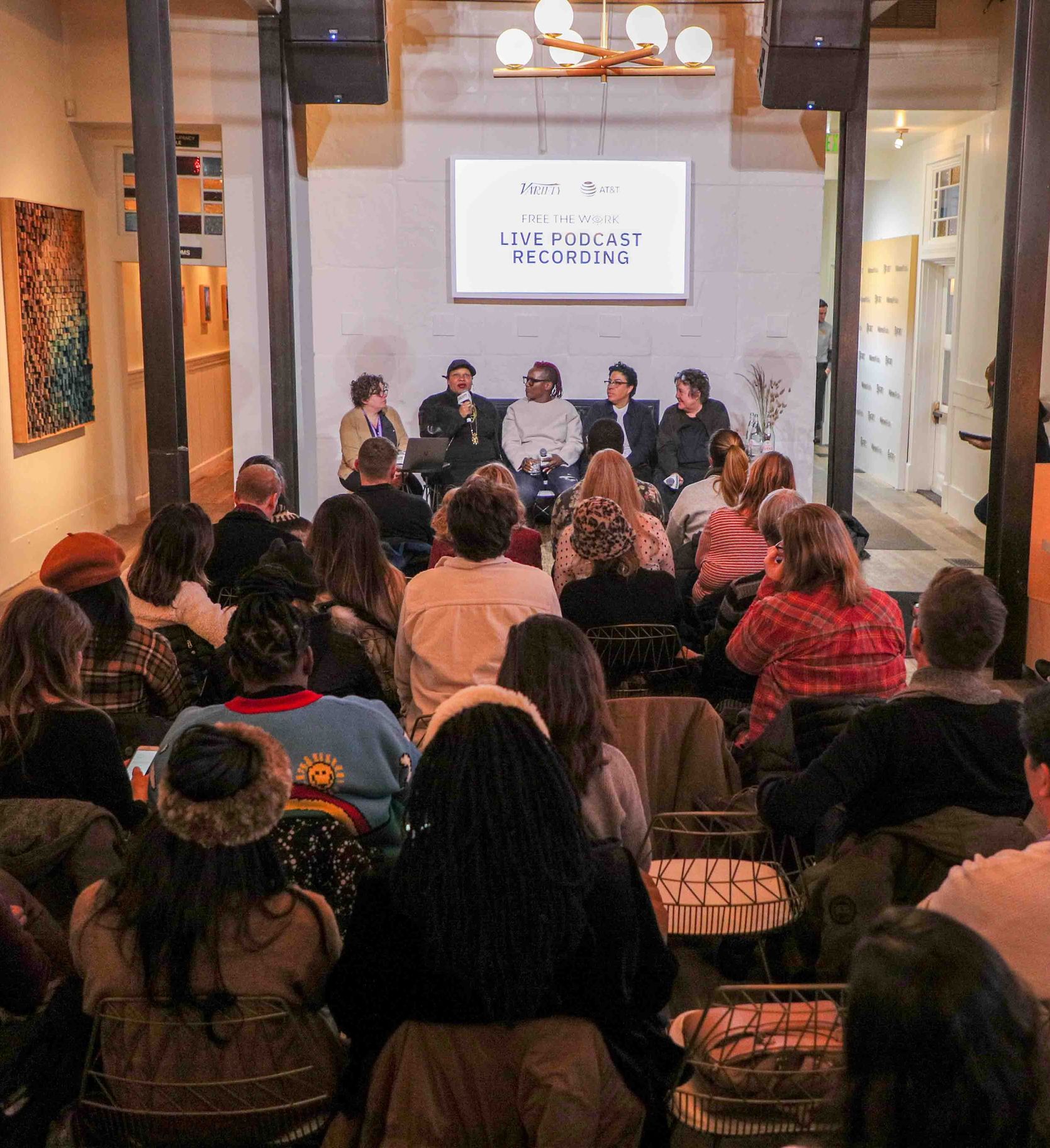On the third episode of "FREE THE WORK Focus: Pride," the FTW podcast mini-series, supported by GLAAD, GLAAD's Head of Talent Anthony Ramos catches up with multitalented filmmaker Rain Valdez. Together, they chat about everything from Rain's come-up in the industry, how they both want to advance the Filipinx community in Hollywood, and dismantling the idea that one represents all.
Subscribe to the FREE THE WORK podcast on Amazon Music, Apple Podcasts, Spotify, Stitcher, and Soundcloud to listen to this episode and get updates on the next one!
Then be sure to follow @GLAAD and @FREETHEWORK across Twitter, Instagram, and Facebook.
Scroll down for the full transcript of the episode!
Rain Valdez
Rain Valdez is an out and proud transgender actress and award-winning filmmaker. Getting her start in playing ‘Coco’ in season 2 of TV Land’s Lopez and doubling in Amazon's Transparent as Miss Van Nuys on screen and a producer behind the scenes. Valdez’s rom-com short Ryans, which she stars in and co-created with Natalie Heltzel, screened in over 15 film festivals worldwide after premiering at Outfest, winning the Jury Award for Best North American Short at the NCGLFF. Rain has been named one of Outfest LA's Next Generation of Filmmakers and has completed Ryan Murphy’s Half Initiative directing program. She recently starred in a Paul Feig directed, half-hour comedy pilot for Freeform TV, guest stars in Amazon’s Sneaky Pete, and can also be seen in the CBS All Access new show Why Women Kill.
Her 7-part web series Razor Tongue, which she wrote and stars in, held its international premiere at both Toronto’s InsideOut and San Francisco’s Frameline Fest, with its most recent premiere held at the 2019 Outfest in Los Angeles with rave reviews. The accomplished series has gone on to win InsideOut Film Festival’s Pitch Please! contest, with a cash prize and an additional $10K going toward her next short film project. It also most recently titled Rain as the first Filipina transgender actress and filmmaker to be nominated for an Emmy in the Outstanding Actress in a Short Form Comedy or Drama Series category. Rain continues to be at the forefront of TV and film making with message and purpose and looks ahead to continued success in the many genres that excites her.
Up next, alongside Rachel Leyco, Rain will star in the trans-led romantic comedy “Re-Live: A Tale of an American Island Cheerleader,” Written by Valdez and Leyco, the comedy centers on a high school in Guam that decides to create a “Do-Over Week” for its 10-year class reunion, where their characters decide to face their past and go back to their hometown to live out their childhood dream but soon falter when their mother’s cancer spreads. The project is currently slated to hit the film festival circuit.
IG: @RainValdez Twitter: @RainValdez

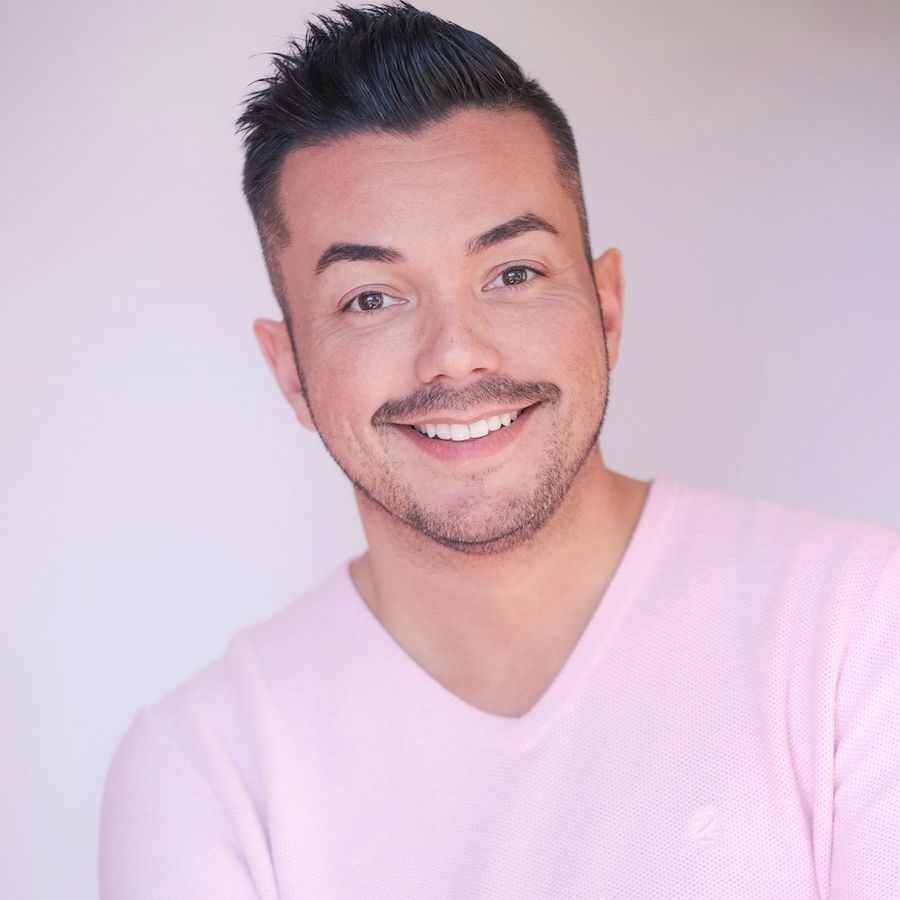
Anthony Ramos
Anthony Allen Ramos is GLAAD's Head of Talent, Supervising Producer of the GLAAD Media Awards and official Entertainment Correspondent. Ramos has more than 17 years of experience in the entertainment industry and joined GLAAD after serving as an Emmy-nominated producer and correspondent for Access Hollywood and Access Hollywood Live. There, he produced and commented on content focusing on TV, music and fashion, and strategized to increase LGBTQ inclusion, bringing LGBTQ celebrities and stories to millions of viewers. Since his start with GLAAD in September 2017, Anthony has secured A-list talent to help with GLAAD’s work including: Beyonce & JAY-Z, Madonna, Britney Spears, Cher, Taylor Swift, Ricky Martin, Barbra Streisand, Demi Lovato, Andy Cohen, Faith Hill & Tim McGraw, Billy Porter, Adam Lambert, Sarah Jessica Parker, Gwyneth Paltrow, Ryan Murphy, Jim Parsons, Ava DuVernay, Anderson Cooper, Don Lemon, and Janet Mock to name a few.
This transcript has been edited for clarity.
Chloe Coover: What's up world we're back with the FREE THE WORK podcast. For the next few episodes, we're bringing you a special mini series supported by our friends at GLAAD spotlighting some of today's most influential LGBTQIA+ creators. On this episode, GLAAD’s head of talent Anthony Ramos chats with prolific multi hyphenate creator Rain Valdez. Together they talk about queer and Filipinx representation in media, creating your own roles, and what's next for the Emmy nominated actress, writer and director, and producer.
Anthony Ramos: Hi, everyone, thanks for joining us for that FREE THE WORK podcast mini series supported by GLAAD if you're just getting familiar, FREE THE WORK is a nonprofit global initiative and searchable talent discovery platform for underrepresented creators. And just as a disclaimer, we got to say the views and opinions of the guests do not necessarily state or reflect those of FREE THE WORK.
I'm Anthony Ramos, GLAAD’s head of talent and today I'm so excited to be joined by a friend, someone who's so talented, a multi hyphenate extraordinare Rain Valdez. Not only is she prolific in front of the camera, having earned an Emmy nomination for the web series "Razor Tongue", but behind the scenes, she's also a writer, a producer, a director. How are you?
Rain Valdez: Hi, Anthony. I'm good. How are you?
AR: I'm loving this Filipina power moment you and I are having right here today. Yeah. So let's just kind of go back to the beginning. Thinking about the Emmy nomination, and like I mentioned all the producing and writing that you do, but tell me your story. Like how did you get here? Like, what was the beginning like of kind of wanting to take over Hollywood? RV: Yeah, I think well, it started really young. I was maybe five or six years old, when I knew I wanted to be an actor. I knew I wanted to be in front of the camera. So it started there. But where I grew up in Guam, I migrated from the Philippines, we just didn't have a lot of access to film and TV. It's a very small island. So when I graduated from high school, that's when I took the leap and bought a one way ticket to Los Angeles.
AR: And that sounds like a movie in itself, bought a one way ticket to LA.
RV: It was one of the biggest risks I've ever done. At the time, one of the biggest decisions of my life. I was already sort of transitioning. So when I got to LA, it was a little easier because nobody knew who I was. Nobody knew my past. And so I was just Rain. And everybody just kind of accepted that. And one of the first things I did was got myself in an acting class and studied acting for a really long time while I was waiting tables and doing a little bit of modeling here and there. But it got to a point where the auditions got a little frustrating. And it kind of gave me a sense of what this industry is really all about. And what it's really like. A lot of roles that I was auditioning for were either stereotypical or misogynistic views of women.
AR: What were the characters they were putting you up for?
RV: You know, the hot nerdy Asian, that or some of the some of the descriptions were like, super gorgeous. And you could tell it was clearly written by men. And as much as I love to embrace my beauty and my femininity, it’s also very intimidating to read a page and kind of think about, ‘Oh, gosh, do I actually look like that?’ So it became very quite clear that if I didn't look a certain way, then I probably wouldn't get the opportunity.
So I quit acting for a little while, and got a job in post production. And then I just started working my way up in post production. I started out as an assistant editor, and eventually became the senior digital intermediate producer for a few post production facilities. So I learned a lot about filmmaking.
Through that, I learned how to finish a film, more importantly, and that's kind of when I started. I have this resource, I have this knowledge of how to finish a film. If I wrote something, and if I shot it, I could bring it to my post house and finish it and make it look amazing. So that's kind of how I started with my filmmaking process. I knew that if I wanted to act, I would have to write something and cast myself in it and produce it. A lot of times in this industry, people don't really know what you're capable of until you show them. And so I just kind of figured out a way to start showing people what I was capable of being Filipino American, and being trans. We're, one, underrepresented, but we're also extremely underestimated. And so if you don't take the step to show what you're capable of, this industry might not never know. Yeah, it's, at the time, it was out of necessity.
But now I realize it's just a part of my creative process. I love being a part of the beginning stages of creating a project, the writing and the producing and directing, as well as acting in it. But I do enjoy so many aspects of that, because what actors don't have at all in this industry is some sort of creative control of their career. And so, for me, once I started doing it, it just made me realize, ‘Oh, if I continue to do this, I can have some sort of control of what my career could look like and, and control the characters I get to play.’
AR: What year was it that you bought your one way ticket?
RV: I moved out here in 2000. So it's been a while? Yeah.
AR: Yeah, 21 years. It's funny that what really resonated with me was it's kind of showing people what you're capable of because it reminds me of myself. When I was at Access Hollywood before I came to GLAAD — someone asked me, first day on the job, what I wanted to do,and I was like, I want to be one of the hosts, I want to be one of the on—camera people. I knew that that's what I wanted to do. And I quickly realized that I was gonna have to, like, show everyone, because you know, everyone says that I want to be on TV I want but I had to prove myself. And I showed them that I could do it. And then I basically like you said, I suddenly went into post production. I was doing the editing and clearance at one point. But it's like I learned everything that I could about the process and ultimately made me a better producer. And it got me to ultimately doing those. But yeah, I'm a big fan of learning everything and like you said, you're kind of creating your own opportunities.
RV: Yeah, you're creating your own opportunities. And it's also so much more fulfilling, when you're not relying so much on an industry that wasn't designed for you to begin with. You know, that's something that I've had to come to terms with. I had to mourn the idea that I'm not really what this industry considers the next best thing, or the next big thing. There was a time where I remember realizing that there's no way anyone would ever put me in a romantic comedy as the lead. I remember when I realized that it made me really sad. So I had to kind of come to terms with that, and almost let the dream go in a way.
AR: You think that's still the case, even with the way things have evolved? I mean, do you think that you still wouldn't be given that opportunity?
RV: I think it's going to happen when I make it happen. I think there's a tremendous amount of room for it, and the possibility is there. But I also still think that there's not enough of us in the decision making process to actually give it the proper go—ahead and the proper trust and also the amount of risk it's going to take to do that. I don't think that we have those people in place yet. And so for me, if it's something that I want to do and make happen, I kind of have to figure out how to do it myself and find the people who want to champion that story. To be the protagonist.
AR: No, absolutely. And it's like, I'm thinking back to the end of last year whenI was interviewing Nico Santos, another fellow Filipino. We were like, let's make the LGBTQ Filipino version of Friends. And I was like, why not? I was like, that's what I mean. I was like, let's call Alec Mapa. Let's make it because, even though Crazy Rich Asians, which Nico is also in and plays a queer character— I remember just seeing that movie, really just going to see it to be entertained. But when I saw someone, like so many people that looked like me because you know, of mixed, being half Filipino. And like Henry Golding being half Malaysian and half English. I was like, it's crazy for me to see someone that looks like me, although I'm not nearly as handsome as Henry Golding. I'm just saying, seeing someone like that leading, being the leading man in a big budget movie. That was a huge deal for me.
RV: First of all, I think you're very handsome. But yeah, I completely agree . There are very few representations, very few films and TV shows that represent the intersections of the communities that I am a part of. So when you start to clock that you're nowhere to be seen, it makes it really hard to figure out where you fit in the world, let alone in an industry that you really want to work in. So I love that idea of a Friends version of our community, because I think that one, Filipino Americans are the second largest immigrant communities here in America after Chinese Americans. And so there's enough of us to know that this content is not only needed, but it's necessary.
AR: Completely, you know, thinking back on when you talked about some of those cringy audition characters that you were given in the beginning, did you find that there was like an over sexualization of like, the Asian female character? There have been so many of those representations that people put on TV, and we need to show that Asian women are many other things beyond just the sex symbol.
RV: Yeah, absolutely. A lot of I mean, when I think back, it's funny to think of the stuff that I had to put myself through. I either had to be a super nerd or super hot and sexy. Definitely hyper sexualized, or I have to kick butt. I remember auditioning for like, assassin roles, or, you know, somebody who really fought a lot, but didn't have a lot to say. I audition for a lot of prostitutes, like a lot of sex workers. Yeah, it was really sad, because I remember just not identifying with any of those things, right? As much as I would like to think that I'm sexy. I don't know that I exude the kind of sexiness that they were looking for. And a lot of times, I was actually told no, right? So I was never Asian enough. I was never sexy enough and never trans enough for some of these opportunities. You know, it does a number on you for sure.
AR: Yeah, that's interesting. You say never trans enough? Like what? You really got that kind of feedback from people when you're trying out for it?
RV: Yeah, sometimes they still do actually.
AR: I don't even know what that means. I mean, it's crazy to think that someone would even say something like that.
RV: Well, if you look at the history of trans representation, a lot of the characters that are out there were mostly played by men. And so you know, I think they have an idea of what trans i. Especially if it's written by someone that's not in our community, oftentimes, it's a transitional story or an oppression story. So they're not looking for the person who's done their transition, and is actually living their life, they're looking for someone who's just starting out, and it's, you know, maybe looks a certain way, and kind of reminds them of the opposite gender, or their assigned gender, I should say. And so, it doesn't really give room for the different types of trans identities in the spectrum. A lot of it is just because they have this idea in their head of what trans is based on, what they see in the media, and based on what actors have portrayed. So that's what they're basing it off of.
AR: Yeah. And just to bring up it's important to remember that at GLAAD, we have not only insisted but enforced that trans representations must be played by trans actors. There's no question. There's no wiggle room about that. And obviously, trans stories specifically should be told by trans people. Really, because it's all about opportunity, you know what I mean? And plus, that's an identity that you only truly know if you are, if you have trans experience. I guess the big question is, talking about creating your own lane and creating opportunities for yourself, what would you say is your drive for storytelling right now? What is it you want to put out into the world and get made by Hollywood?
RV: Well, definitely authentic nuanced stories by Filipino Americans and transgender identifying folks, but not specifically about the identities and more really about our stories about the diaspora of our experience. Stories that are universal and relatable. Another thing that I came across as a creator as well, is that it's too niche, or they already have an LGBTQ story or this character on the show. But if done with the right people, I actually think that our stories are very universal, because it's about relationships, and it's about family, and it's about finding your authentic selves. So those are the stories that I want to keep telling.
And also, in the genres— okay, so I think that romantic comedies are the most political genre there is because it serves as propaganda for who gets to be loved. Right, right, is to the world who and what and when someone gets to experience love. So I want to tell stories and genres where we've been completely absent from or completely erased or reduced as a side character, or the butt of the joke. And, and kind of just show the world, mainly our communities that, ‘Hey, this is for you. This is for you. This is for us. Ee get to have this. We get to celebrate our identities. We see you. You belong in this world, even though TV and media has told you otherwise.’ And so I never got that growing up. I never got to see a Filipina American trans women being successful doing the damn thing. And being celebrated and acknowledged. And so if there's a young person out there who's like me and gets to see me or some of the other actors, actresses that are in my community and get to feel validated, but also get to feel less alone, then I feel like I've done my job.
AR: I love that. It's funny. Actually when you mentioned that there is a large group of queer Filipina/ Filipino people working in Hollywood, I mean, thinking, you know, Geena [Rocero], or Isabel and Lingua Franca. which I know Yeah, is it? Oh, yeah. It's, you know, there's, do you find that there is kind of like a, like a sisterhood or like, a deep connection with some of those creators and yourself?
RV: Absolutely. I get very excited when I see— it's about succeeding. And just I get goosebumps, just thinking about it. It's very rare for me to find someone who's like me, and also have the opportunity to support them. It's very rare, so we support each other, we champion each other. And same thing with Gina, we're very close. And it's, you know, it's such a small community, but at the same time, it's from where we were five years ago, it's actually it's, it's pretty big at this point, you know, it's like it's Yeah, many of us and we keep finding each other and, and each of us are so this is why it's so important to dismantle this idea of nishiura. This idea of, you know, one represents all is that Isabel's creative mind and and, and storytelling abilities is so vastly different from mine, and different kind of storytelling. It's a different kind of perspective, different genres, if you will Well, and but just as needed just as necessary as my stuff is, that's what I love about what's happening now and more of us finding each other and more of us getting opportunities is that we get to kind of show the different authentic stories that actually exist within within our communities.
AR: Yeah, like for me just about my experience. I want to see a story or like— I would say, I grew up very very much identifying with the white side of my culture, because I grew up with my mom. And, you know, I wouldn't say it was— I mean, it wasn't until much later that I actually identified and realized that I have this whole other part of myself that I don't know a lot about. And so I would love to see a story like that where someone who grew up maybe a little more with, you know, identifying with their Caucasian side and then going back and learning about their other Asian side, because that's really what I've been on this path about. And it's funny, Geena [Rocero] and I right before the pandemic we're supposed to, she was supposed to show me how to make lumpia. But obviously, we've been separate for a while because of the pandemic, but I see that she's making it even with [ed note: indiscernible], which I'm all about. So I want Geena to have some sort of cooking show or something. I would totally tune in for that.
RV: I think we've talked about that at one point. And I think it's in the plans.
AR: So you mentioned you are from the Philippines, you ended up living in Guam, and then went from Guam to LA? What was it like to be a trans, or I guess a queer person in Guam? Because I really don't have any sort of context. And was it accepting where people, you know— what was that like?
RV: Good question. Guam is no, I wouldn't say it's very accepting. I think maybe moreso now it is. But Guam has very deep rooted traditional values and religious beliefs that stem from Catholicism, and Christianity. And so no, because of that, because the island is predominantly Catholic and Christian, it wasn't very accepting growing up. So it was very difficult. And, I mean, I got out of there as soon as I could. But it is a great place to raise a family and make friends I think. I mean, at least for me, at the time, when I was there, there was a lot of outdoor activities to do at the beach. It's five minutes away. And you know, just like in any other place, even in the in the red states, there's always a way to find each other, there's always a way to find community. And I was very fortunate enough that I had loving and supporting friends when I was trying to figure out who I was. And I was transitioning.
So lucky for me that the struggle was with my family, mostly. And it wasn't really until I moved down here where they got to really understand what was going on. And I think for them, when they finally saw that it wasn't just me, and that it was other trans people out in the world, that's when they started to realize that— well, they started to let go of the idea that I don't belong in this world. I think mainly what their fears were associated with that no one was ever going to love me, right? You know, or that because of the Bible, what I'm doing, it's a sin. And so, there's a lot of those archaic beliefs that I think still have a lot of work to do.
AR: How is your relationship with your family now? If you don't mind me asking. Have they kind of come up a little bit of way at least?
RV: Yeah, well, you know, my younger sisters are very supportive. And my mom passed away in 2009. But she was very supportive before that, and I have family in the Philippines. And I'm actually not— they seem supportive, like through social media, but I'm actually not that sure, because I haven't spent that much time with them. I do have an older sister who still has a little bit of trouble getting past it. So that's the toughest relationship in my life right now is my older sister, and she goes back and forth. There are times when she's, you know— we're just chatting and it's totally fine and we're just sisters. But then there are times when you can tell she struggles with what she believes in and what I represent and that been a challenge and continues to be.
AR: When was the last time you were in the Philippines?
RV: Hmm. 2009?
AR: How is it in terms of being a queer person in the Philippines? Is it more accepted? Are people still pretty traditional, do you think?
RV: I think it's still very traditional. Yeah. But like I said, no matter where you are, you can find community. And there's trans people in some degrees of acceptance who are able to hold community and do pageantry and entertainment. So there is a place, but I don't think it's legally recognized yet. And I think that's kind of where the colonized mentality kind of gets in the way and where religion plays a huge part as well. Because of those things. It's really hard for our communities to be completely free from prejudice and bigotry and discrimination. It's, it's, it's a tough place to be, I think, in the Philippines.
AR: Well, thank you for sharing that I want to move on to something more happy and unpleasant. Let's talk about the Emmy nomination for "Razor Tongue" for you. That was a huge deal. I remember we talked about it, I was so excited for you. Such a weird time too. Because it was, really, right in the middle of the pandemic.
Tell me about experience from getting the nomination to doing your virtual red carpet in your yard, which I love. You know, unfortunately, you didn't win. But I think, just so you know, I have a philosophy on that. And so I'm glad it didn't happen in that year because when it does happen, when you do win the Emmy, I want it to be in a year when you can be onstage and you can be in front of an audience and you can take with— we don't want to do it in a pandemic year. But tell me about all of that. Because that was amazing, and so well deserved.
RV: Absolutely. Thank you. Yeah 2020 was a really interesting year for me because it took away so many things, right? So many opportunities, so much normalcy, so I kind of had to shift gears and focus on other things like my self-care, and my family and my friends, and really allow myself to just clock out and take a break, because I work all the time, and I'm all over the place. And so I wasn't expecting very much.
To be honest, I was kind of at peace with, hey, if it happens it happens, and you know, I wasn't even promoting it or doing a lot of social media. I remember, like a week before voting closed, I got a text from a friend. And they were like, ‘Oh, I voted for you.’ And I was getting multiples of those because it was like a week before voting. And I was like, ‘Oh my gosh, I should probably say something.’ So I went on social media, and I went on my emails, and I just started like— campaigning was so last minute that we didn't have a budget to do. And we didn't have a platform to campaign or whatever. And I didn't have a PR person at the time. So you know, I wasn't really expecting anything. And then when it happened, I was supposed to be doing something else. But that got rescheduled. So I was actually free. And my assistant was like, ‘Well, you know, you can watch the Emmy announcement now.’
Laverne and Leslie Jones and a bunch of other people were making these announcements, but they only announced the big names on the television. But something told me ‘Well, you should just look anyway, on their website, to just to see.’ So I did, I went on my laptop and I just kept scrolling and it was like 35 pages, and I finally found my category. And there was my name along with Caitlin Olson and Anna Kendrick and Jasmine Cephas Jones and then one other person. And I was truly shocked. I started shaking. I didn't know what to do with myself. And then I was getting a bunch of messages, a bunch of text and emails and phone calls. People were seeing the same thing. But I texted my assistant, I was like, ‘Oh my god, I am nominated.’ And he was like, ‘Oh my god, I'm looking at it right now.’ And so it was a lot of that a lot of just like, ‘Oh my god, you're nominated’ you know?
And one of the first people that I texted was Laverne because I knew she probably didn't see it because she was just coming off of finding out that she was nominated. So she sent me the sweetest, most beautiful message after I told her and I thanked her for making this a possibility for more of us. Yeah. I think I like dancing every night for like three weeks straight. I just had so much excitement and so much energy that every night I was dancing and celebrating, and I was also very appreciative that it happened at a time where I can actually reflect on what this means for me and for my communities.
Because if it was the year before, and I was on the red carpet and doing so many things, and being all over the place, like I usually am, I don't know that I would have appreciated the gravity of it al. I think I would have been just too distracted. And so I did appreciate that I had the time to really just sit in the glory of it all and the historical aspect of it all as well because I was constantly being reminded by the media and my community as well of what this meant, not only for me, but what it meant for them. You know, it was a very special time.
And yes, it did suck during a pandemic, and I didn't get to celebrate in ways that would have been really cool, like celebrating with you or with Geena in person. I didn't get to do any of that. But it was still there. Regardless of that it was still very, very special.
AR: Yeah. Oh, it was so special. I think the next Emmys will be in person. So what I mean, that's a good kind of thing to wrap up. What is next for you? What are you working on? What do you have in the works? What do you want to do?
RV: Yeah, thanks. I'm going to continue creating. I think the Emmy was so validating, in a way that, you know, before you kind of wonder, ‘Am I doing the right thing? Or am I just wasting my time?’ And so the Emmy was just like, ‘No, you're doing the right thing. You're doing exactly what you're supposed to be doing, creating opportunities for yourself and for other people.’ So for me, it's like, okay, I could relax a little bit. And I could continue doing what I'm doing without second guessing myself. So I do plan on creating more.
I have season two of "Razor Tongue" in the works. It's already written. And we have an amazing cast. It's a bigger show and Angelica Ross is attached to produce and she also has a role and I love. Yeah, and Jamie Clayton is also joining the cast as well as Alexandra Billings. So I'm very excited about it.
And then I have my romantic comedy feature Re-live: The Tale of an American Island Cheerleader that I'm doing with Rachel Leyco and Shant Joshi of Fae pictures. And I'm really excited about that because it's getting this coming a lot closer to actual production, which is early next year. And I’m actually flying out. I haven't told very many people, but I'm actually flying out in June to Guam and to Hawaii to do our scouting and meeting with crew and whatnot. So I'll be gone for the month of June just working on Re-live and figuring out where we're going to be shooting and figuring out the logistics.
AR: Re-live was the one that you did the live reading for during the pandemic, right. Yeah, I remember that. That's awesome.
RV: I'm really excited about it. And we just did an overhaul rewrite of the script based on some of the notes that we've been getting. And I'm really excited about this draft. And I think this could be this could have been this could be the close to final draft before we start shooting.
AR: That's huge. Thank you. Just in case, can you share with the people the basic premise of what that story is Re-live? Yes. So
RV: Yes, so, Re-live: A Tale of an American Island Cheerleader is about a transgender woman who is successful and has been away from her own her home island for 10 years since she graduated. So I took a lot of inspiration from my own life. But she goes back home after 10 years because she's been invited to her high school reunion. And the high school reunion is a do-over week. So she gets to go back and be the person she always wanted it to be that she didn't get to be in high school. So she goes back and tries out to be a cheerleader.
But when she gets home, there's a lot of secrets that she discovers about her family about her mom's ailing sickness and her transphobic sister is hiding something from her as well. And so there's all of these things that she discovers that become a bit more important. becomes a little bit more challenging to do the do-over a week. But she wants to do it and her mom's encouraging her to do it because she gets to relive her life which, you know, not many of us get an opportunity to.
AR: I mean, I think it sounds fabulous. I can't wait to see that. I mean, are you hoping it's a big screen or Netflix or something along those lines, do you have any thoughts on what you want and how you want it to live?
RV: I mean, the dream would be like Crazy Rich Asians, you know, like, big budget, red carpet opening, and then the worldwide or whatever, and then and then streaming. So that's the dream, of course. But I'm also very open to it being a straight to streamer if we find the right partnerships.
AR: Right. Put it out there. Well, I have no doubt that if anyone can make it happen, you definitely can. Well, Rain and thank you so much. And thank you to FREE THE WORK for having us. Be sure to search freethework.com for more filmmakers to work with and follow the FREE THE WORK podcast on Spotify and all other podcast platforms will be dropping a new episode every Thursday through Pride Month, so you don't want to miss it. Thank you.
Chloe: Thanks for listening. You can watch Rain’s web series “Razor Tongue: on YouTube now. And don't forget, follow FREE THE WORK and GLAAD on all social media and podcast platforms for updates on the next episode drop. Until next time, this has been the FREE THE WORK podcast supported by GLAAD.
